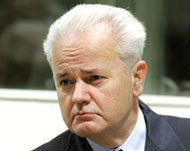Kosovo war crimes trial starts
Six former Serbian officials have appeared in the war crimes court in The Hague accused of “a widespread and systematic attack” on Kosovo’s civilians in 1999.

The accused are the former president, Milan Milutinovic, the former prime minister, Nikola Sainovic, and four generals -Dragoljub Ojdanic, Nebojsa Pavkovic, Vladimir Lazarevic and Sreten Lukic.
They are charged with war crimes and crimes against humanity over the forced deportation of about 800,000 Kosovan Albanians, the murder of hundreds of people including women and children and sexual assaults by Serbian troops.
“The evidence will show that these six accused were co-perpetrators with Slobodan Milosevic [the late Yugoslav president] in a joint criminal enterprise … the aim of which was to ensure continued Serbian control over the province,” Thomas Hannis, prosecuting, said on the first day of the trial on Monday.
Milosevic setback
From a legal standpoint, the case against Milutinovic and his co-defendants has become more important after the death of Milosevic in March as it will help establish what happened in Kosovo, a province populated mainly by ethnic Albanians.
Milutinovic succeeded Milosevic as president of Serbia in 1997. Milosevic died of a heart attack in his cell in The Hague on March 11, months before a verdict was expected in his war crimes trial.
 |
|
Milosevic died in a UN cell in |
Much of the evidence to be presented is expected to be similar to the prosecution’s case concerning Kosovo in the Milosevic trial.
The prosecution said that they were planning to call the former Nato commander, General Wesley Clark, and Klaus Naumann, the head of Nato’s military commission who also gave evidence in the Milosevic trial.
Milutinovic has pleaded not guilty to crimes against humanity including murder, deportation and persecution, and one charge of war crimes, arguing that he had little real power as Serbian president.
‘De facto control’
Prosecutors allege that Milutinovic had at least formal control over the Serb forces who killed hundreds of ethnic Albanians and forced hundreds of thousands from their homes.
“Milutinovic’s prominent position … together with his close relationship with Milosevic … all combined to give him substantial de jure and de facto control over the army and other organs,” Hannis said.
Milutinovic was Milosevic’s closest ally and representative during negotiations over Kosovo in early 1999, which ended in stalemate and resulted in the 78-day Nato bombing of Yugoslavia and the eventual withdrawal of Serb forces.
Milutinovic stayed in his largely ceremonial post after reformers ousted Milosevic in 2000, protected by presidential immunity. He kept a low profile and stayed out his term until December 2002, before surrendering to The Hague tribunal.